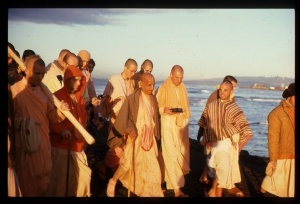SB 5.24.30: Difference between revisions
No edit summary |
(Vanibot #0054 edit - transform synonyms into clickable links, which search similar occurrences) |
||
| Line 24: | Line 24: | ||
<div class="synonyms"> | <div class="synonyms"> | ||
''tataḥ adhastāt'' | ''[//vanipedia.org/wiki/Special:VaniSearch?s=tataḥ&tab=syno_o&ds=1 tataḥ] [//vanipedia.org/wiki/Special:VaniSearch?s=adhastāt&tab=syno_o&ds=1 adhastāt]'' — below the planetary system Mahātala; ''[//vanipedia.org/wiki/Special:VaniSearch?s=rasātale&tab=syno_o&ds=1 rasātale]'' — on the planet called Rasātala; ''[//vanipedia.org/wiki/Special:VaniSearch?s=daiteyāḥ&tab=syno_o&ds=1 daiteyāḥ]'' — the sons of Diti; ''[//vanipedia.org/wiki/Special:VaniSearch?s=dānavāḥ&tab=syno_o&ds=1 dānavāḥ]'' — the sons of Danu; ''[//vanipedia.org/wiki/Special:VaniSearch?s=paṇayaḥ&tab=syno_o&ds=1 paṇayaḥ] [//vanipedia.org/wiki/Special:VaniSearch?s=nāma&tab=syno_o&ds=1 nāma]'' — named Paṇis; ''[//vanipedia.org/wiki/Special:VaniSearch?s=nivāta&tab=syno_o&ds=1 nivāta]-[//vanipedia.org/wiki/Special:VaniSearch?s=kavacāḥ&tab=syno_o&ds=1 kavacāḥ]'' — Nivāta-kavacas; ''[//vanipedia.org/wiki/Special:VaniSearch?s=kāleyāḥ&tab=syno_o&ds=1 kāleyāḥ]'' — Kāleyas; ''[//vanipedia.org/wiki/Special:VaniSearch?s=hiraṇya&tab=syno_o&ds=1 hiraṇya]-[//vanipedia.org/wiki/Special:VaniSearch?s=puravāsinaḥ&tab=syno_o&ds=1 puravāsinaḥ]'' — Hiraṇya-puravāsīs; ''[//vanipedia.org/wiki/Special:VaniSearch?s=iti&tab=syno_o&ds=1 iti]'' — thus; ''[//vanipedia.org/wiki/Special:VaniSearch?s=vibudha&tab=syno_o&ds=1 vibudha]-[//vanipedia.org/wiki/Special:VaniSearch?s=pratyanīkāḥ&tab=syno_o&ds=1 pratyanīkāḥ]'' — enemies of the demigods; ''[//vanipedia.org/wiki/Special:VaniSearch?s=utpattyāḥ&tab=syno_o&ds=1 utpattyāḥ]'' — from birth; ''[//vanipedia.org/wiki/Special:VaniSearch?s=mahā&tab=syno_o&ds=1 mahā]-[//vanipedia.org/wiki/Special:VaniSearch?s=ojasaḥ&tab=syno_o&ds=1 ojasaḥ]'' — very powerful; ''[//vanipedia.org/wiki/Special:VaniSearch?s=mahā&tab=syno_o&ds=1 mahā]-[//vanipedia.org/wiki/Special:VaniSearch?s=sāhasinaḥ&tab=syno_o&ds=1 sāhasinaḥ]'' — very cruel; ''[//vanipedia.org/wiki/Special:VaniSearch?s=bhagavataḥ&tab=syno_o&ds=1 bhagavataḥ]'' — of the Personality of Godhead; ''[//vanipedia.org/wiki/Special:VaniSearch?s=sakala&tab=syno_o&ds=1 sakala]-[//vanipedia.org/wiki/Special:VaniSearch?s=loka&tab=syno_o&ds=1 loka]-[//vanipedia.org/wiki/Special:VaniSearch?s=anubhāvasya&tab=syno_o&ds=1 anubhāvasya]'' — who is auspicious for all planetary systems; ''[//vanipedia.org/wiki/Special:VaniSearch?s=hareḥ&tab=syno_o&ds=1 hareḥ]'' — of the Supreme Personality of Godhead; ''[//vanipedia.org/wiki/Special:VaniSearch?s=eva&tab=syno_o&ds=1 eva]'' — certainly; ''[//vanipedia.org/wiki/Special:VaniSearch?s=tejasā&tab=syno_o&ds=1 tejasā]'' — by the Sudarśana cakra; ''[//vanipedia.org/wiki/Special:VaniSearch?s=pratihata&tab=syno_o&ds=1 pratihata]'' — defeated; ''[//vanipedia.org/wiki/Special:VaniSearch?s=bala&tab=syno_o&ds=1 bala]'' — strength; ''[//vanipedia.org/wiki/Special:VaniSearch?s=avalepāḥ&tab=syno_o&ds=1 avalepāḥ]'' — and pride (because of bodily strength); ''[//vanipedia.org/wiki/Special:VaniSearch?s=bila&tab=syno_o&ds=1 bila]-[//vanipedia.org/wiki/Special:VaniSearch?s=īśayāḥ&tab=syno_o&ds=1 īśayāḥ]'' — the snakes; ''[//vanipedia.org/wiki/Special:VaniSearch?s=iva&tab=syno_o&ds=1 iva]'' — like; ''[//vanipedia.org/wiki/Special:VaniSearch?s=vasanti&tab=syno_o&ds=1 vasanti]'' — they live; ''[//vanipedia.org/wiki/Special:VaniSearch?s=ye&tab=syno_o&ds=1 ye]'' — who; ''[//vanipedia.org/wiki/Special:VaniSearch?s=vai&tab=syno_o&ds=1 vai]'' — indeed; ''[//vanipedia.org/wiki/Special:VaniSearch?s=saramayā&tab=syno_o&ds=1 saramayā]'' — by Saramā; ''[//vanipedia.org/wiki/Special:VaniSearch?s=indra&tab=syno_o&ds=1 indra]-[//vanipedia.org/wiki/Special:VaniSearch?s=dūtyā&tab=syno_o&ds=1 dūtyā]'' — the messenger of Indra; ''[//vanipedia.org/wiki/Special:VaniSearch?s=vāgbhiḥ&tab=syno_o&ds=1 vāgbhiḥ]'' — by the words; ''[//vanipedia.org/wiki/Special:VaniSearch?s=mantra&tab=syno_o&ds=1 mantra]-[//vanipedia.org/wiki/Special:VaniSearch?s=varṇābhiḥ&tab=syno_o&ds=1 varṇābhiḥ]'' — in the form of a mantra; ''[//vanipedia.org/wiki/Special:VaniSearch?s=indrāt&tab=syno_o&ds=1 indrāt]'' — from King Indra; ''[//vanipedia.org/wiki/Special:VaniSearch?s=bibhyati&tab=syno_o&ds=1 bibhyati]'' — are afraid. | ||
</div> | </div> | ||
Latest revision as of 22:15, 18 February 2024

A.C. Bhaktivedanta Swami Prabhupada
TEXT 30
- tato 'dhastād rasātale daiteyā dānavāḥ paṇayo nāma
- nivāta-kavacāḥ kāleyā hiraṇya-puravāsina iti vibudha-pratyanīkā
- utpattyā mahaujaso mahā-sāhasino bhagavataḥ sakala-lokānubhāvasya
- harer eva tejasā pratihata-balāvalepā bileśayā iva vasanti
- ye vai saramayendra-dūtyā vāgbhir mantra-varṇābhir indrād bibhyati
SYNONYMS
tataḥ adhastāt — below the planetary system Mahātala; rasātale — on the planet called Rasātala; daiteyāḥ — the sons of Diti; dānavāḥ — the sons of Danu; paṇayaḥ nāma — named Paṇis; nivāta-kavacāḥ — Nivāta-kavacas; kāleyāḥ — Kāleyas; hiraṇya-puravāsinaḥ — Hiraṇya-puravāsīs; iti — thus; vibudha-pratyanīkāḥ — enemies of the demigods; utpattyāḥ — from birth; mahā-ojasaḥ — very powerful; mahā-sāhasinaḥ — very cruel; bhagavataḥ — of the Personality of Godhead; sakala-loka-anubhāvasya — who is auspicious for all planetary systems; hareḥ — of the Supreme Personality of Godhead; eva — certainly; tejasā — by the Sudarśana cakra; pratihata — defeated; bala — strength; avalepāḥ — and pride (because of bodily strength); bila-īśayāḥ — the snakes; iva — like; vasanti — they live; ye — who; vai — indeed; saramayā — by Saramā; indra-dūtyā — the messenger of Indra; vāgbhiḥ — by the words; mantra-varṇābhiḥ — in the form of a mantra; indrāt — from King Indra; bibhyati — are afraid.
TRANSLATION
Beneath Mahātala is the planetary system known as Rasātala, which is the abode of the demoniac sons of Diti and Danu. They are called Paṇis, Nivāta-kavacas, Kāleyas and Hiraṇya-puravāsīs [those living in Hiraṇya-pura]. They are all enemies of the demigods, and they reside in holes like snakes. From birth they are extremely powerful and cruel, and although they are proud of their strength, they are always defeated by the Sudarśana cakra of the Supreme Personality of Godhead, who rules all the planetary systems. When a female messenger from Indra named Saramā chants a particular curse, the serpentine demons of Mahātala become very afraid of Indra.
PURPORT
It is said that there was a great fight between these serpentine demons and Indra, the King of heaven. When the defeated demons met the female messenger Saramā, who was chanting a mantra, they became afraid, and therefore they are living in the planet called Rasātala.